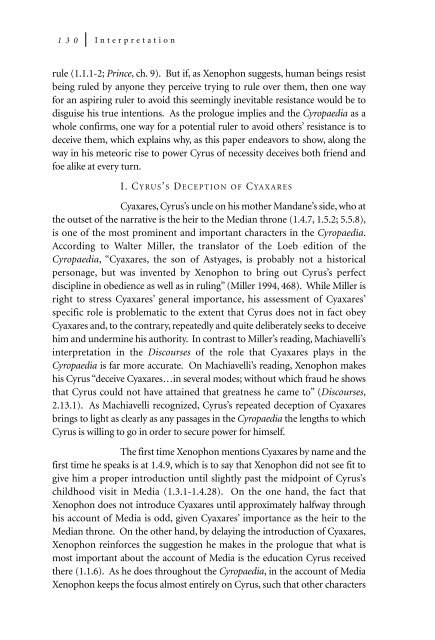Spring 2007 - Interpretation: A Journal of Political Philosophy
Spring 2007 - Interpretation: A Journal of Political Philosophy
Spring 2007 - Interpretation: A Journal of Political Philosophy
Create successful ePaper yourself
Turn your PDF publications into a flip-book with our unique Google optimized e-Paper software.
1 3 0 I nterpretation<br />
rule (1.1.1-2; Prince, ch. 9). But if, as Xenophon suggests, human beings resist<br />
being ruled by anyone they perceive trying to rule over them, then one way<br />
for an aspiring ruler to avoid this seemingly inevitable resistance would be to<br />
disguise his true intentions. As the prologue implies and the Cyropaedia as a<br />
whole confirms, one way for a potential ruler to avoid others’ resistance is to<br />
deceive them, which explains why, as this paper endeavors to show, along the<br />
way in his meteoric rise to power Cyrus <strong>of</strong> necessity deceives both friend and<br />
foe alike at every turn.<br />
I. CYRUS’ S D ECEPTION OF C YAXARES<br />
Cyaxares, Cyrus’s uncle on his mother Mandane’s side, who at<br />
the outset <strong>of</strong> the narrative is the heir to the Median throne (1.4.7, 1.5.2; 5.5.8),<br />
is one <strong>of</strong> the most prominent and important characters in the Cyropaedia.<br />
According to Walter Miller, the translator <strong>of</strong> the Loeb edition <strong>of</strong> the<br />
Cyropaedia, “Cyaxares, the son <strong>of</strong> Astyages, is probably not a historical<br />
personage, but was invented by Xenophon to bring out Cyrus’s perfect<br />
discipline in obedience as well as in ruling” (Miller 1994, 468). While Miller is<br />
right to stress Cyaxares’ general importance, his assessment <strong>of</strong> Cyaxares’<br />
specific role is problematic to the extent that Cyrus does not in fact obey<br />
Cyaxares and, to the contrary, repeatedly and quite deliberately seeks to deceive<br />
him and undermine his authority. In contrast to Miller’s reading, Machiavelli’s<br />
interpretation in the Discourses <strong>of</strong> the role that Cyaxares plays in the<br />
Cyropaedia is far more accurate. On Machiavelli’s reading, Xenophon makes<br />
his Cyrus “deceive Cyaxares…in several modes; without which fraud he shows<br />
that Cyrus could not have attained that greatness he came to” (Discourses,<br />
2.13.1). As Machiavelli recognized, Cyrus’s repeated deception <strong>of</strong> Cyaxares<br />
brings to light as clearly as any passages in the Cyropaedia the lengths to which<br />
Cyrus is willing to go in order to secure power for himself.<br />
The first time Xenophon mentions Cyaxares by name and the<br />
first time he speaks is at 1.4.9, which is to say that Xenophon did not see fit to<br />
give him a proper introduction until slightly past the midpoint <strong>of</strong> Cyrus’s<br />
childhood visit in Media (1.3.1-1.4.28). On the one hand, the fact that<br />
Xenophon does not introduce Cyaxares until approximately halfway through<br />
his account <strong>of</strong> Media is odd, given Cyaxares’ importance as the heir to the<br />
Median throne. On the other hand, by delaying the introduction <strong>of</strong> Cyaxares,<br />
Xenophon reinforces the suggestion he makes in the prologue that what is<br />
most important about the account <strong>of</strong> Media is the education Cyrus received<br />
there (1.1.6). As he does throughout the Cyropaedia, in the account <strong>of</strong> Media<br />
Xenophon keeps the focus almost entirely on Cyrus, such that other characters

















